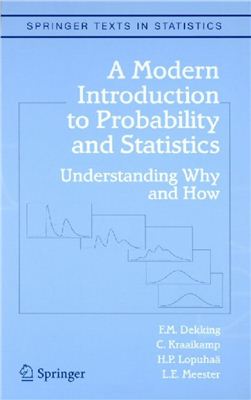Springer-Verlag London Limited, 2005; 485 pages.
Probability and statistics are fascinating subjects on the interface between mathematics and applied sciences that help us understand and solve practical problems. We believe that you, by leaing how stochastic methods come about and why they work, will be able to understand the meaning of statistical statements as well as judge the quality of their content, when facing such problems on your own. Our philosophy is one of how and why: instead of just presenting stochastic methods as cookbook recipes, we prefer to explain the principles behind them.
In this book you will find the basics of probability theory and statistics. In addition, there are several topics that go somewhat beyond the basics but that ought to be present in an introductory course: simulation, the Poisson process, the law of large numbers, and the central limit theorem. Computers have brought many changes in statistics. In particular, the bootstrap has eaed its place. It provides the possibility to derive confidence intervals and perform tests of hypotheses where traditional (normal approximation or large sample) methods are inappropriate. It is a mode useful tool one should lea about, we believe.
Examples and datasets in this book are mostly from real-life situations, at least that is what we looked for in illustrations of the material. Anybody who has inspected datasets with the purpose of using them as elementary examples knows that this is hard: on the one hand, you do not want to boldly state assumptions that are clearly not satisfied; on the other hand, long explanations conceing side issues distract from the main points. We hope that we found a good middle way.
The book is aimed at undergraduate engineering students, and students from more business-oriented studies (who may gloss over some of the more mathematically oriented parts).
Probability and statistics are fascinating subjects on the interface between mathematics and applied sciences that help us understand and solve practical problems. We believe that you, by leaing how stochastic methods come about and why they work, will be able to understand the meaning of statistical statements as well as judge the quality of their content, when facing such problems on your own. Our philosophy is one of how and why: instead of just presenting stochastic methods as cookbook recipes, we prefer to explain the principles behind them.
In this book you will find the basics of probability theory and statistics. In addition, there are several topics that go somewhat beyond the basics but that ought to be present in an introductory course: simulation, the Poisson process, the law of large numbers, and the central limit theorem. Computers have brought many changes in statistics. In particular, the bootstrap has eaed its place. It provides the possibility to derive confidence intervals and perform tests of hypotheses where traditional (normal approximation or large sample) methods are inappropriate. It is a mode useful tool one should lea about, we believe.
Examples and datasets in this book are mostly from real-life situations, at least that is what we looked for in illustrations of the material. Anybody who has inspected datasets with the purpose of using them as elementary examples knows that this is hard: on the one hand, you do not want to boldly state assumptions that are clearly not satisfied; on the other hand, long explanations conceing side issues distract from the main points. We hope that we found a good middle way.
The book is aimed at undergraduate engineering students, and students from more business-oriented studies (who may gloss over some of the more mathematically oriented parts).

